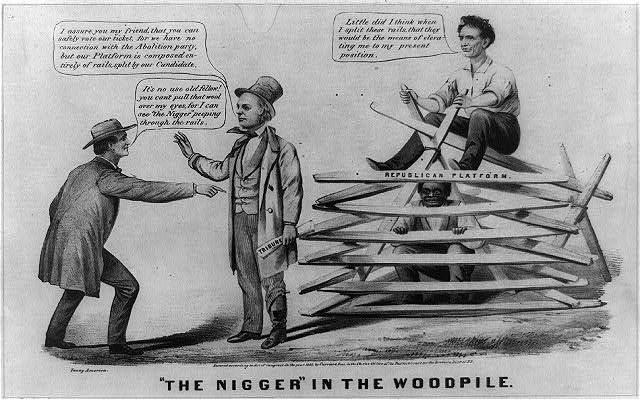
Posted on 03/10/2013 8:19:44 AM PDT by BroJoeK
Ten Neo-Confederate Myths (+one)
In fact, a study of the earliest secessionists documents shows, when they bother to give reasons at all, their only major concern was to protect the institution of slavery.
For example, four seceding states issued "Declarations of the Immediate Causes Which Induce and Justify Secession from the Federal Union".
These documents use words like "slavery" and "institution" over 100 times, words like "tax" and "tariff" only once (re: a tax on slaves), "usurpation" once (re: slavery in territories), "oppression" once (re: potential future restrictions on slavery).
So secession wasn't just all about slavery, it was only about slavery.
In fact, secessionists biggest real complaint was that Washington was not doing enough to enforce fugitive slave laws in Northern states.
Mississippi's Declaration is instructive since it begins by explaining why slavery is so important:
It goes on to complain that the Federal Government is not enforcing its own Fugitive Slave laws, saying that anti-slavery feeling:
In fact, the Compromise of 1850 shifted responsibility for enforcing Fugitive Slave laws from northern states to the Federal Government, so this complaint amounts to a declaration that Washington is not powerful enough.
In fact, no where in the Founders' literature is the 10th Amendment referenced as justifying unilateral, unapproved secession "at pleasure".
Instead, secession (or "disunion") is always seen as a last resort, requiring mutual consent or material usurpations and oppression.
For example, the Virginia Ratification Statement says:
James Madison explained it this way:
"It is the nature & essence of a compact that it is equally obligatory on the parties to it, and of course that no one of them can be liberated therefrom without the consent of the others, or such a violation or abuse of it by the others, as will amount to a dissolution of the compact.
Applying this view of the subject to a single community, it results, that the compact being between the individuals composing it, no individual or set of individuals can at pleasure, break off and set up for themselves, without such a violation of the compact as absolves them from its obligations."
In fact, the 1860 Republican platform only called for restricting slavery from territories where it did not already exist.
And Lincoln repeatedly said he would not threaten slavery in states where it was already legal.
In fact, neither out-going President Buchanan nor incoming President Lincoln did anything to stop secessionists from declaring independence and forming a new Confederacy.
And Buchanan did nothing to stop secessionists from unlawfully seizing Federal properties or threatening and shooting at Federal officials.
Nor did Lincoln, until after the Confederacy started war at Fort Sumter (April 12, 1861) and then formally declared war on the United States, May 6, 1861.
In fact, no Confederate soldier was killed by any Union force, and no Confederate state was "invaded" by any Union army until after secessionists started war at Fort Sumter and formally declared war on May 6, 1861.
The first Confederate soldier was not killed directly in battle until June 10, 1861.
In fact, from Day One, Confederacy was an assault on the United States, and did many things to provoke and start, then formally declared war on the United States.
From Day One secessionists began to unlawfully seize dozens of Federal properties (i.e., forts, armories, ships, arsenals, mints, etc.), often even before they formally declared secession.
At the same time, they illegally threatened, imprisoned and fired on Federal officials -- for example, the ship Star of the West attempting to resupply Fort Sumter in January 1861 -- then launched a major assault to force Sumter's surrender, while offering military support for secessionist forces in a Union state (Missouri) .
And all of that was before formally declaring war on the United States.
After declaring war, the Confederacy sent forces into every Union state near the Confederacy, and some well beyond.
Invaded Union states & territories included:
In every state or territory outside the Confederacy proper, Confederate forces both "lived off the land" and attempted to "requisition" supplies to support Confederate forces at home.
Secessionists also assaulted the United states by claiming possession of several Union states and territories which had never, or could never, in any form vote to seceed.
So bottom line: the Confederacy threatened every Union state and territory it could reach.
In fact, there are remarkably few records of civilians murdered or raped by either side, certainly as compared to other wars in history.
But "pillaging" is a different subject, and both sides did it -- at least to some degree.
The Union army was generally self-sufficient, well supplied from its own rail-heads, and seldom in need to "live off the land."
In four years of war, the best known exceptions are Grant at Vicksburg and Sherman's "march to the sea".
In both cases, their actions were crucial to victory.
By contrast, Confederate armies were forced to "live off the land" both at home and abroad.
Yes, inside the Confederacy itself, armies "paid" for their "requisitions" with nearly worthless money, but once they marched into Union states and territories, their money was absolutely worthless, and so regardless of what they called it, their "requisitions" were no better than pillaging.
Perhaps the most famous example of Confederate pillaging, it's often said, cost RE Lee victory at the Battle of Gettysburg: while Lee's "eyes and ears" -- J.E.B. Stuart's cavalry -- was out pillaging desperately needed supplies in Maryland and Pennsylvania, Lee was partially blind to Union movements and strengths.
In fact, only one crime is defined in the US Constitution, and that is "treason".
The Constitution's definition of "treason" could not be simpler and clearer:
The Constitution also provides for Federal actions against "rebellion", "insurrection", "domestic violence", "invasion" declared war and treason.
So Pro-Confederate arguments that "there was no treason" depend first of all on the legality of secession.
If their secession was lawful, then there was no "treason", except of course among those citizens of Union states (i.e., Maryland, Kentucky & Missouri) which "adhered to their Enemies, giving them Aid and Comfort".
But the bottom line is this: in previous cases -- i.e., the Whiskey Rebellion -- once rebellion was defeated, rebels were all released or pardoned by the President of the United States.
And that pattern, first established by President Washington, was followed under Presidents Lincoln and Johnson.
In fact, lawful secession by mutual consent could be 100% constitutional, if representatives submitted and passed such a bill in Congress, signed by the President.
Alternatively, states could bring suit in the United States Supreme Court for a material breach of contract and have the Federal government declared an "oppressive" or "usurping" power justifying secession.
But Deep-South slave-holders' unilateral, unapproved declarations of secession, without any material breach of contract issues, followed by insurrection and a declaration of war on the United States -- these our Founders clearly understood were acts of rebellion and treason -- which the Constitution was designed to defeat.
That leads to the larger question of whether our Pro-Confederates actually respect the Constitution as it was intended or, do they really wish for a return to those far looser, less binding -- you might even say, 1960s style "free love" marriage contract -- for which their union was named: the Articles of Confederation?
But consider: the Confederacy's constitution was basically a carbon copy of the US Constitution, emphasizing rights of holders of human "property".
So there's no evidence that Confederate leaders were in any way more tolerant -- or "free love" advocates -- regarding secession from the Confederacy than any Union loyalist.
Then what, precisely, does the allegation of "statism" mean?
The truth is, in this context, it's simply one more spurious insult, and means nothing more than, "I don't like you because you won't agree with me."
Poor baby... ;-)
Plus, one "bonus" myth:
No, no, no way...
Yes, FDR could be the O-man's political daddy, and his political mother those 1960s radicals like, well, his mother.
And one of his grandparents is well known: his intellectual maternal grandpa is Karl Marx.
But the other grandpa is certainly not Lincoln.
Rather, it is Lincoln's evil doppelganger, the other tall thin President born in Kentucky: Jefferson Davis.
How can that be?
Well, here's my list -- both Obama and Davis are/were:

You’re a brave man. The replies should be interesting. I’ve always thought the Secession declarations were pretty damning.

I will say this: States Rights are an important concept. Somewhere along the line, the federal government decided that it was everybody's boss, and that is a shame.
+1
I can’t see that this is the entire story. It doesn’t fit with all the things that were going on at the time and this is a bad rap on the South.
lol Did you get up this morning, and just feel like starting a fight?
This thread is gonna be a good one! lol
Whatever the reasons, there is no doubt that the formation of the Confederacy was once the greatest domestic threat to the well being of the United States. Today the greatest threat is the Democratic Party.
Talk about being PC, the South wouldn’t allow the presence of abolitionist literature, c.f. the trial of Reuben Crandall, M.D. in the District of Columbia.
How so?


we will try to get it right this time....
....actually I look toward the Declaration of Independence(no, you are right, it is not a current legal document) to determine the best way to protect the most important aspects of the Constitution and the Bill Of Rights.
no statement on secession is necessary in the constitution, if you have reached the point to reissue the Declaration of Independence.
MOLON LABE!!
Someone please show me the official documents or discussions concerning doing away with slavery that caused the south to succeed. The south did not just leave the union because of slavery.
While we're used to getting a "bad rap" in the South, it really is quite old and tiresome.
You wouldn't know it by the "ignorant southerner" stereotypes hurled at us, but slavery was abolished close to 150 years ago, and--news flash to the slavery-obsessed!!--black people are actually free in the South, and they're treated quite well here.
More divide and conquer. People need to learn history. Seriously.
I like it...
LOL! Perfect first reply.
Yep, and yep!
Disclaimer: Opinions posted on Free Republic are those of the individual posters and do not necessarily represent the opinion of Free Republic or its management. All materials posted herein are protected by copyright law and the exemption for fair use of copyrighted works.